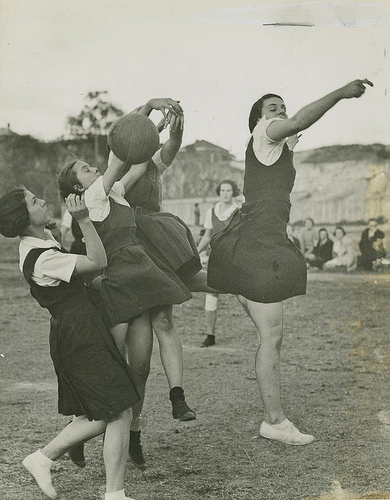netball is not a “premium sport”?
When I was in year seven I thought that it would be a good idea to try out for my school’s netball team. I turned up at the gym, the air rich in oestrogen, in my little blue pleated skirt. Growing up, I was always one of the taller kids, so it was assumed that the best bib for me would be labelled ‘GD’. I could get up in the grill of opposing players and flail my arms high into the air, being careful not. to. make. contact. Contained in my little semi-circle, I watched the other girls pass the ball to each other, feet firmly planted on the ground apart from a few girls inculcated in the world of afterschool basketball who could never seem to stand still. The hypnotic regularity of the umpire’s whistle sent my gaze upwards to the exposed insulation and piping of the gym (this was in the days before those school hall renovations). I thought about whether I wanted to take out my lunch time juice now or if it could wait until after the game as the ball sailed past my left ear.
I was assigned the position of third reserve on the school team.
As weird as it sounds, netball was an elegant sport to me. It’s highly feminine with pretty uniforms and there seemed to be a certain dignity to be found in deliberately not diving into other players. Netballers do have to cut their nails short, just in case they get into a scratchy situation, and when played competitively the game can be brutal. Still, it struck me as a game for girls and women who stand up straight, smile when they meet strangers, and prepare orange quarters for half-time.
Sociologists have argued that the gendered nature of sports like netball point to a ‘hidden curriculum’ whereby particular values are implicitly expounded. In the UK it’s well-documented that boys play rugby and cricket and while girls are given politer and, if I’m honest, less intense games such as netball and rounders. Obviously that’s changing (and, by the way, the Australian women’s cricket team absolutely rocks), but still, people tend to be taken aback by the idea of a woman plunging into another in order to take possession of a ball that the first woman worked very hard indeed to get. Either that or they find the idea erotic, which is also a problem.
The bigger problem is that when a sport is simply understood as a ‘women’s sport’, it implicitly becomes lesser. Or, in the words of Channel Ten big wigs, ‘insignificant’. Eight weeks before the start of the 2013 ANZ Netball Championship, Netball Australia has been abandoned by its broadcast partner. The reason cited: Netball is ‘not a premium sport’.
This is despite the fact that while netball may not pack out the MCG, it does have the highest sport participation rate amongst amateur players and young people Australia-wide with over 1.2 million people taking part in local competitions. Moreover, the Australian netball team happens to be world champion, and if there is anything to be said about the Australian character it is that international sporting success is consistently met with the potential for overwhelming, if sudden, fandom.
Maybe if Channel Ten gave it a chance and actually did a decent job of advertising, the netball championships would appear on every LCD flat screen in Australia. It seems that a big problem women’s sport has faced is crappy air times and the overall vibe that networks are begrudgingly screening the competition out of a favour or something. Perhaps networks could do more to build a sense of frenzy in their viewers like they did in the lead-up to 2011’s Royal Wedding or like Channel Ten does every year for Masterchef. The alternative to that, that people simply aren’t interested in netball regardless of whether or not it’s hosted by Matt Preston, doesn’t make a whole lot of sense given the hours Australians have collectively spent on grassroots training and competition. Plus, if they were to whack on a Twitter feed to appease the Gen Ys, they’d probably have a ratings winner on their hands.
But still lingering in background is the gendered nature of netball. Why aren’t there very many male netballers, for instance? And why is it that girls are specifically encouraged to go into a relatively peaceful sport where only the best players would risk substantially messing up their hair?
Netball can be quite problematic when viewed from a feminist lens. Historically at least, it comes with the presumption that women and girls are dainty and ought not shove each other too much. Yet, at the same time, when watching international-grade netball, the word ‘dainty’ doesn’t come to mind. It’s also one of the few sports in Australia where women totally and unequivocally dominate. Netball clubs also encourage women to see each other as teammates and friends, and provide ample opportunity for healthy fun.
The whole world of sport is a very sexist place, with men often earning more prize money and sponsorship money than women in the same sport. There are also plenty of female ‘versions’ of sports which go untelevised and almost completely unacknowledged (e.g. AFL). The implication that women are lesser, or ‘insignificant’, athletes simply because they are women is grossly unfair.
Moreover, the ramification is that girls and women are simply going to become less engaged in sport and less likely to participate in an area of culture that in essence shuns them. So I think, why not embrace netball? Especially at the level of the ANZ Championship where the competitors aren’t dainty orange-cutters, but talented women who are the best in the world. But while we’re at it, why not show girls how to tackle too?



awesome picture! Great efforts to describe netball is not a “premium sport”